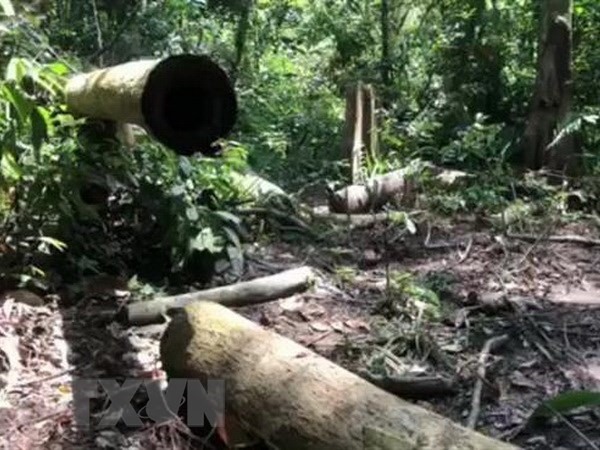 Environment
Environment

Deforestation continues to damage natural forests in southern Bình Phước Province in spite of the Government’s order to close natural forest gates, Vietnam News Agency reported.
 |
| Illegal logging is a persistent issue in many parts of southern Bình Phước Province. — VNA/VNS Photo |
BÌNH PHƯỚC — Deforestation continues to damage natural forests in southern Bình Phước Province in spite of the Government’s order to close natural forest gates, Vietnam News Agency reported.
The provincial Forest Management Department said local agencies had already discovered 124 violations of forestry management regulations this year, including 30 cases of illegally transporting wood and 28 cases of deforestation.
The latest case unfolded last week, when forest rangers on patrol in Tân Lập Commune, Đồng Phú District found 24 trees being illegally cut down. Many of the trees were large, with their diametres reaching one metre.
Head of the Forest Management Unit of the district, Bùi Xuân Ngọc, told Vietnam News Agency that some round wood pieces were left at the scene. The case is still under investigation.
Province authorities have also discovered tens of cases of unlawful wood trading, storing and processing during this period.
Forests in the province’s Bù Đốp and Bù Gia Mập Districts have also been ravaged by illegal loggers who chopped down 30 ươi (malva nut) trees just for the nuts.
The total amount of wood illegally felled was over 35 cu.m.
Ươi seeds are often used in traditional Chinese medicine to ease gastrointestinal disorders and soothe soar throats. As the market price of ươi seeds rose, people rushed to the protected forests to hunt for nuts. At present, ươi seeds are sold at a price of around VNĐ 300,000 (US $13) each.
At a press briefing in June, Chairman of the People’s Committee of Bù Đốp District Đoàn Văn Thảo said anyone discovered to have illegally cut down the trees would be severely punished. He also warned officials not to “cover” for the violations.
However, he said the lack of workers and tough natural conditions made it difficult to inspect and protect the whole forest. — VNS




